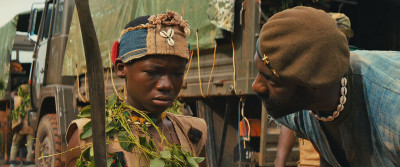
What stands out the most about Cary Fukunaga’s film “Beasts of No Nation” is its staunch refusal to turn into a political statement.
A film about child soldiers in Africa could have easily turned into a blame game if based on real life events. However, as the title implies, these children fight for no nation at all. They are a part of the Native Defense Forces and are supposedly defending their nameless country from a war between an illegitimate government and a group of rebels.
Many have already criticized the film for not fleshing out the depicted conflict, but this is what stands out as the film’s greatest strength. Fukunaga’s latest work is not concerned with who the good guy is. Rather, it is concerned with the decreasing morality of its characters.
The film follows Agu (Abraham Attah), a young boy from a small village in Africa. He lives happily with his family, and the film does an excellent job of setting up his relationships with his friends and family. Soon after this, the war reaches his village and his life changes forever. Without giving too much away, Agu eventually joins up with an NDF battalion that is led by the Commandant (Idris Elba). What follows is a visceral and disturbing spiral into the darkness of war, all from the perspective of a child.
Similar to classics such as “Apocalypse Now,” “Beasts” is a disturbing look at how war can turn men, or boys, into monsters. Agu is exposed to a cruel world of violence and abuse. Even at the hands of his own battalion, he is taken advantage of.
Watching Agu suffer physical and sexual abuse is heart wrenching, but the film never basks in it. There is a subtle dignity throughout the entire film, never allowing itself to revel in its horrific subject matter. Rather than focusing on the acts themselves, the camera is always on the faces of the characters. When Agu is made to kill someone for the first time, the close-up swaps back and forth between him and the man begging for mercy.
This concentration on the emotion is what makes the film so powerful. Agu becomes slowly brainwashed by the ideals of this group. He is seduced by their slogans justifying their actions and establishing them as the rightful victors. Agu’s moral descent is captivating and makes for an emotional experience that few other films have matched in recent memory.
All of this is even more impressive considering that Agu is played by a first-time child actor. Attah’s performance is in line with the trend of subtlety throughout the film. Fukunaga makes great use of close-ups to either showcase emotional intensity or to highlight the quiet undertones of a character’s psyche.
Elba, as the other star of the film, humbly brings his star power to garner some attention to a small film. Elba is no slouch in his role as the Commandant, making it very apparent that this is a passion project for him. He plays an enthusiastic and persuasive leader, and there is no question as to why so many would follow him. The dynamic between Elba and Attah is the driving force behind the film, and it never slows down.
Not only is Fukunaga the director of “Beasts,” but he is also its writer and cinematographer, meaning he had greater control over the film’s presentation. Best known for his work on the first season of HBO’s “True Detective,” Fukunaga is not a novice at making something look good. And thankfully, “Beasts” is no exception.
While Fukunaga used a dark and somber color palette for “True Detective,” “Beasts” utilizes a wide range of colors, often saturated and contrasting, to create absolutely stunning visuals of the war-torn African landscape.
Fukunaga’s talented camera work is also on display throughout the film. His famous six-minute tracking shot in “True Detective” may be given a run for its money by a similarly impressive 4-minute tracking shot in “Beasts of No Nation.”
While the scene in “True Detective” was more action-oriented, the one in “Beasts” is emotion-driven. It provides the climax of Agu’s moral degradation, and the point in which he realizes he has reached rock bottom. It is one of the most moving scenes in the entire film, perfectly complemented by Agu’s reflective narration and Dan Romer’s chilling score.
By the end of the film, Agu is not the same innocently naive boy he was at the beginning. He views himself as a monster — the titular beast of the film. Agu becomes a victim of the madness of war, and as a result, he loses his childish innocence.
“Beasts of No Nation” was released Friday on Netflix.

























































































































Grant Sellars • Oct 20, 2015 at 7:20 pm
Thank you!
Alex Peña • Oct 19, 2015 at 4:13 pm
When they raid that house and Agu mistakes that woman for his mother. I missed it this first time too, but after thinking about I didn’t remember any cuts during that scene. So I went back and rewatched and sure enough, it was all one shot.
Grant Sellars • Oct 19, 2015 at 10:46 am
What moment in the film brought the 4 minute tracking shot? I must’ve missed it. I noticed one that was about a minute and a half when Agu is walking through the trenches. But when is the 4 minute one? Thanks!